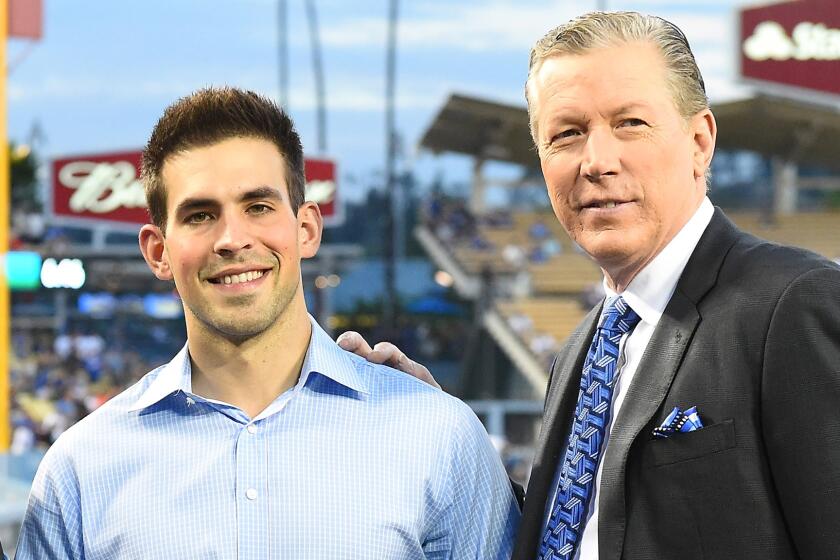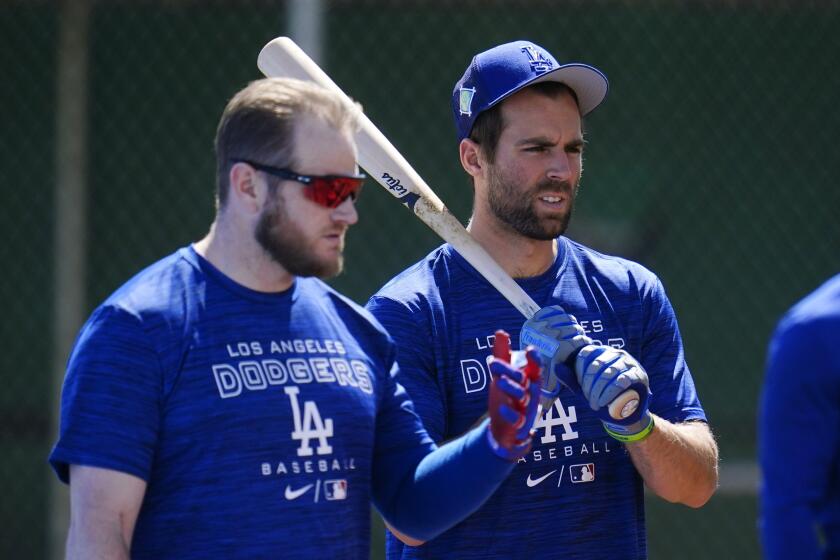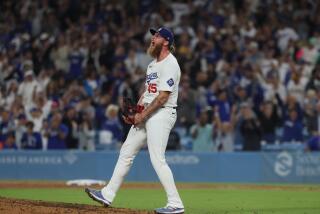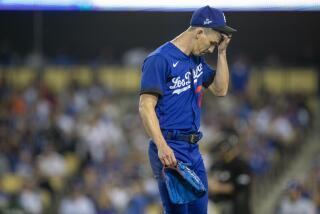How MLB’s latest grand experiment is fueling skepticism and mistrust among players
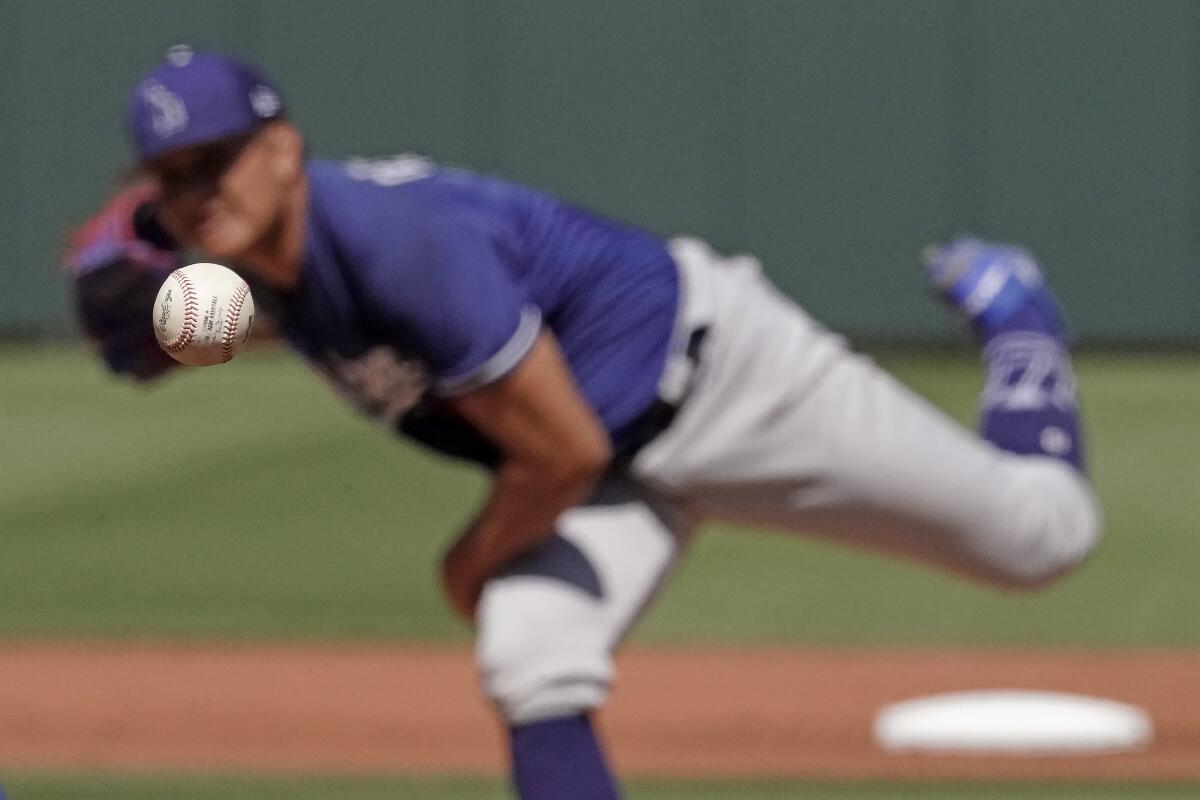
- Share via
ATLANTA — There’s a new addition to Dodger Stadium for the 2022 season that fans won’t see but could impact the games they watch.
A humidor occupies a room down the hallway from the home dugout. It will be powered around the clock this season, storing baseballs at a precise temperature and humidity before they’re used in games starting with the team’s home opener next Thursday against the Cincinnati Reds. It’s the result of the league’s latest experiment.
This season, for the first time, Major League Baseball will store game balls in humidors at all 30 stadiums. Previously limited to 10 ballparks, most famously at Coors Field to counter the thin air in Colorado, the storage unit will be used across the board in attempt to standardize baseballs in different environments. The humidors were recommended in a 2018 study commissioned by MLB that examined home run rates.
Dodgers play-by-play TV broadcaster Joe Davis will call the World Series beginning this season, replacing Joe Buck.
The science is complicated. The effects are a mystery. And the unknown adds to the skepticism, frustration, and anger players have with Major League Baseball’s handling of the most fundamental part of the sport: the baseball.
“I’m sure it’ll mess up a lot of things,” Dodgers shortstop Trea Turner said this week. “They always come up with these ideas, but they don’t seem to pan out correctly. So, I don’t know. We’ll see. I’m sure something will happen and then halfway through the year there’ll be an adjustment made and whether we know it or not, I’m sure they’ll change it.”
Turner was referring to MLB’s recent history of changing the composition of its baseballs without notice — before, during, and after seasons. The strong feelings come at a time when MLB commissioner Rob Manfred is attempting to repair relationships and build trust with players after the league’s 99-day lockout.
“Nobody knows,” Dodgers pitcher Clayton Kershaw said. “Whatever MLB says, they don’t know either. … Every way they rub up the ball is different. Every ball that they make is different. Every way that they put the mud on the ball is different. Every way they check guys now. It’s all a crapshoot. Nobody knows. Whatever MLB thinks is going to happen, it’ll probably be the opposite.”
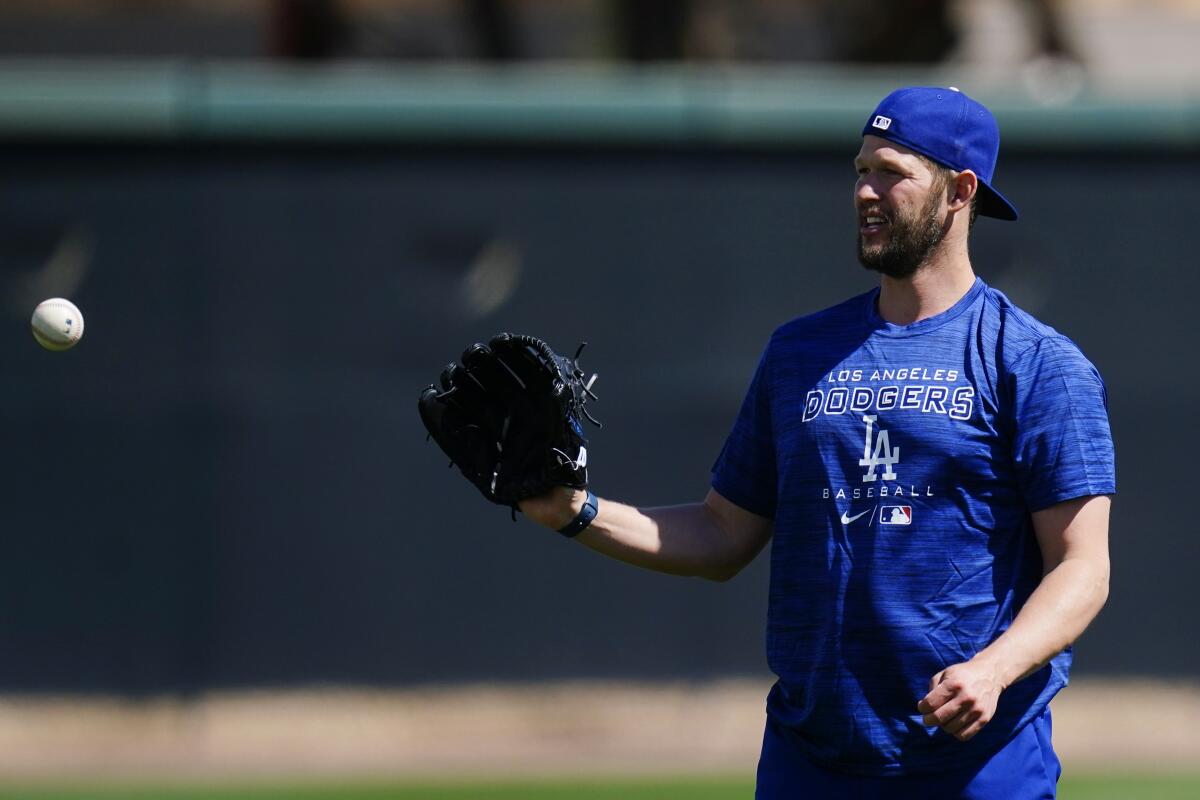
The widespread cynicism reached its first boiling point in 2017 as teams combined to set a record for home runs in a season, smashing the previous mark established in 2000 at the height of the steroid era by nearly 500.
Conspiracy theories swirled that summer. The balls seemed juiced to players. In July, MLB sent a memo to all 30 clubs asserting the balls were unchanged. But independent studies later refuted the claim. In March 2018, MLB relented, saying their study confirmed the balls used in 2017 traveled farther because of better carry and less drag.
“It is frustrating that we haven’t had the same ball since I’ve been a big leaguer, every year,” said Atlanta Braves catcher Travis d’Arnaud, who made his major league debut in 2013. “I think even month by month it’s different. Week by week, day by day.”
The mistrust was fueled again this offseason. In November, MLB acknowledged using two different baseballs — one more that travels farther than the other — last season. The league cited manufacturing shortages related to the COVID-19 pandemic. Players aren’t buying it.
“How can you trust the people when they tell you nothing’s changed and then at the end of the year, they’re like, ‘Oh, yeah, we did do it,’ ” Dodgers reliever Blake Treinen said. “You can only lie so much.”
Two other developments, in addition to the implementation of humidors across the majors, could affect how the ball behaves this season.
The Dodgers failed to win the NL West for the first time in nine years last season, but they are huge favorites to regain the crown in 2022.
Pitchers confronted the first change when they reported to spring training. In the past, rosin bags, which pitchers use to enhance grip on the mound, were different at each ballpark. This year, rosin bags at every stadium will be the same. MLB partnered with San Francisco-based Pelican Bat Wax to eliminate variables.
The other change arrived halfway through spring training.
In response to rampant use around the majors, MLB last season began enforcing its ban of foreign substances by having umpires check pitchers for sticky stuff in June.
Umpires checked hats, belts, and gloves. Guilty pitchers faced a suspension and pitchers’ spin rates initially dropped across the board, but the average crept up at the end of the 2021 season, according to MLB. This season will be different. MLB notified players in mid-March that umpires will be tasked with checking pitchers’ hands.
“Obviously they think Spider Tack is still in the game and I don’t know how it could be,” Dodgers pitcher Walker Buehler said. “I thought the game at the end of the year was pretty good. If they can’t make baseball consistent, I don’t know how they can keep asking us to change everything that guys do, like, literally month by month now. So, at least this time they let us know, what, two weeks before the season, not in the middle of the season.”
Dodgers manager Dave Roberts cited a lack of clarity and consistency with the rule. He wondered how an umpire will be able to decipher between an illegal substance and a combination of sweat and rosin. He thinks standards will be arbitrary, varying from umpire to umpire.
It’s one of several concerns surrounding the baseball in every clubhouse entering the 2022 season. Questions abound. The answers will come. When, exactly, is to be determined.
More to Read
Go beyond the scoreboard
Get the latest on L.A.'s teams in the daily Sports Report newsletter.
You may occasionally receive promotional content from the Los Angeles Times.

